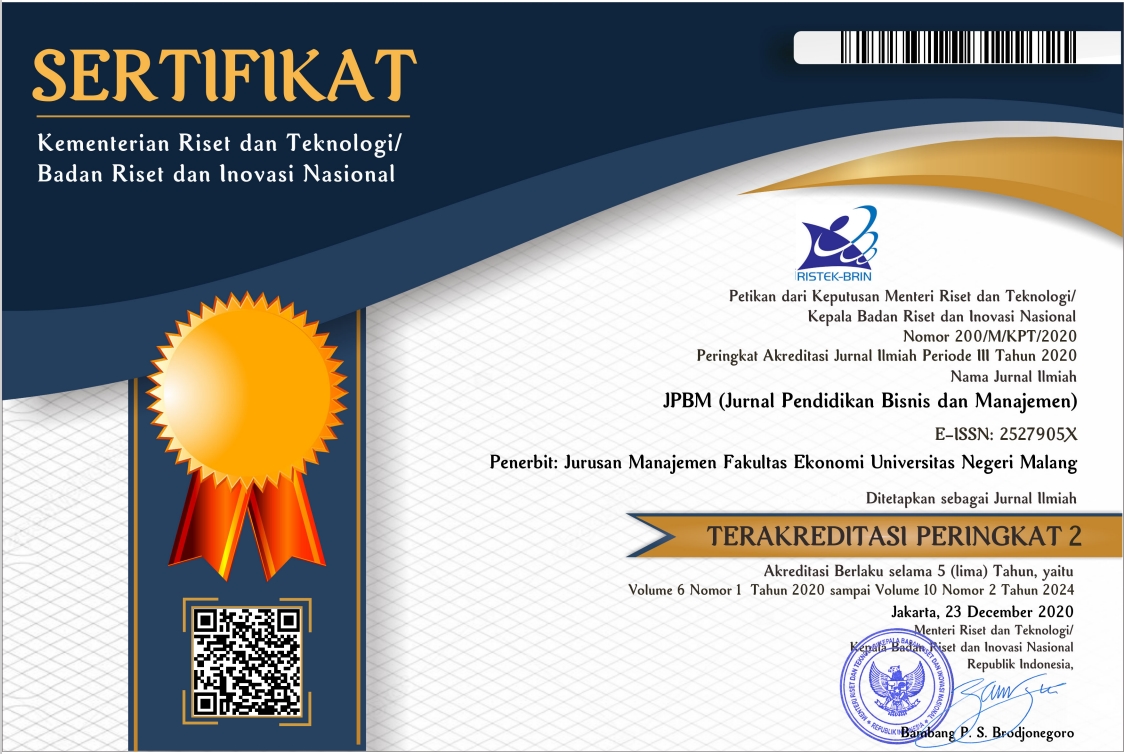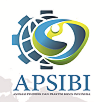The Implementation of Project Based Learning (PjBL) Based on STEM: A Reflection of Concept and Reality within Learning Process in Business Department of Vocational High School
Abstract
The 21st century education expects students to have the skills to solve problems, develop knowledge, be able to develop high degree of thinking and critical thinking. This expectation requires schools to be able to take an innovative learning approach. This study aims at determining the implementation of the STEM-based Project Based Learning (PjBL) model in General Administration subjects as well as how it impacts student learning outcomes. This research is a survey based on the implementation of Classroom Action Research (CAR) by the practicum teacher. This Classroom Action Research requirements that were included in the observation were at least two cycles with two meetings per cycle. The results showed that the implementation of the STEM-based Project Based Learning (PjBL) model of teachers experienced more problems related to the interpretation of each component of the planning process for the preparation of learning tools and specifically difficulties when the process of real-life context learning activities in class. However, this learning model provided benefits in strengthening participants to improve learning outcomes
Keywords: Learning Outcomes, STEM approach, Project Based Learning
Full Text:
PDFReferences
Afriana, J., Permanasari, A., & Fitriani, A. (2016). Penerapan project based learning terintegrasi STEM untuk meningkatkan literasi sains siswa ditinjau dari gender. Jurnal Inovasi Pendidikan IPA, 2(2), 202–212. https://doi.org/10.21831/jipi.v2i2.8561
Alifa, D. M., Azzahroh, F., & Pangestu, I. R. (2018). PENERAPAN METODE STEM (SCIENCE, TECHNOLOGY, ENGINEERING, MATHEMATIC) BERBASIS PROYEK UNTUK MENINGKATKAN KREATIVITAS SISWA SMA KELAS XI PADA MATERI GAS IDEAL. Prosiding SNPS (Seminar Nasional Pendidikan Sains), 22.
Bybee R. (2013). The Case for STEM Education: Challenges and Opprtunity, Virginia: NSTA press Arlington.
Darling-Hammond, L., Flook, L., Cook-Harvey, C., Barron, B., & Osher, D. (2019). Implications for educational practice of the science of learning and development. Applied Developmental Science, 1–44. https://doi.org/10.1080/10888691.2018.1537791
Ejiwale, J. A. (2013). Barriers To Successful Implementation of STEM Education. Journal of Education and Learning (EduLearn). https://doi.org/10.11591/edulearn.v7i2.220
Furi, L. M. I., Handayani, S., & Maharani, S. (2018). EKSPERIMEN MODEL PEMBELAJARAN PROJECT BASED LEARNING DAN PROJECT BASED LEARNING TERINTEGRASI STEM UNTUK MENGINGKATKAN HASIL BELAJAR DAN KREATIVITAS SISWA PADA KOMPETENSI DASAR TEKNOLOGI PENGOLAHAN SUSU. Jurnal Penelitian Pendidikan, 35(1), 49-60–60. https://doi.org/10.15294/jpp.v35i1.13886
Jauhariyyah, F. R., Suwono, H., & Ibrohim. (2017). Science, Technology, Engineering, and Mathematics Project Based Learning ( STEM-PjBL ) pada Pembelajaran Sains. Pros. Seminar Pend. IPA Pascasarjana UM.
Kang, N.-H. (2019). A review of the effect of integrated STEM or STEAM (science, technology, engineering, arts, and mathematics) education in South Korea. Asia-Pacific Science Education, 5(1), 6. https://doi.org/10.1186/s41029-019-0034-y
Lutfi, L., Azis, A. A., & Ismail, I. (2018). Pengaruh Project Based Learning Terintegrasi Stem Terhadap Literasi Sains, Kreativitas dan Hasil Belajar Peserta Didik. Seminar Nasional Biologi, 0(0), Article 0. https://ojs.unm.ac.id/semnasbio/article/view/6984
Maulana, M. (2020). PENERAPAN MODEL PROJECT BASED LEARNING BERBASIS STEM PADA PEMBELAJARAN FISIKA SIAPKAN KEMANDIRIAN BELAJAR PESERTA DIDIK. Jurnal Teknodik, 2, 39. https://doi.org/10.32550/teknodik.v0i2.678
McCarthy, M., & Carter, R. (2006). Explorations in corpus linguistics. Cambridge University Press.
Mulyasa. (2013). Pengembangan dan Implementasi kurikulum 2013. Bandung: Remaja Rosadakarya.
Nessa, W., Hartono, Y., & Hiltrimartin, C. (2017). Pengembangan Buku Siswa Materi Jarak pada Ruang Dimensi Tiga Berbasis Science, Technology, Engineering, and Mathematics (STEM) Problem-Based Learning di Kelas X. Jurnal Elemen. https://doi.org/10.29408/jel.v3i1.273
Nurazizah, Suwarma, I. R., Jauhari, A., & Kaniawati, I. (2018). Implementasi pembelajaran STEM: kajian terhadap pencapaian hasil belajar siswa. Prosiding Seminar Nasional Fisika (SINAFI) 2018.
Parno, Yuliati, L., Munfaridah, N., Ali, M., Rosyidah, F. U. N., & Indrasari, N. (2020). The effect of project based learning-STEM on problem solving skills for students in the topic of electromagnetic induction. Journal of Physics: Conference Series, 1521, 022025. https://doi.org/10.1088/1742-6596/1521/2/022025
Quang, L., Hoang, L., Chuan, V., Nam, N., Anh, N., & Nhung, V. (2015). Integrated Science, Technology, Engineering and Mathematics (STEM) Education through Active Experience of Designing Technical Toys in Vietnamese Schools. British Journal of Education, Society & Behavioural Science. https://doi.org/10.9734/bjesbs/2015/19429
Reis‐Jorge, J. M. (2005). Developing teachers’ knowledge and skills as researchers: A conceptual framework. Asia-Pacific Journal of Teacher Education, 33(3), 303–319. https://doi.org/10.1080/13598660500286309
Sukmawijaya, Y., Suhendar, S., & Juhanda, A. (2019). PENGARUH MODEL PEMBELAJARAN STEM-PJBL TERHADAP KEMAMPUAN BERPIKIR KREATIF SISWA PADA MATERI PENCEMARAN LINGKUNGAN. Jurnal BIOEDUIN : Program Studi Pendidikan Biologi, 9(2), 28–43. https://doi.org/10.15575/bioeduin.v9i2.5893
Sumarni, W., Wijayati, N., & Supanti, S. (2019). ANALISIS KEMAMPUAN KOGNITIF DAN BERPIKIR KREATIF SISWA MELALUI PEMBELAJARAN BERBASIS PROYEK BERPENDEKATAN STEM. J-PEK (Jurnal Pembelajaran Kimia), 4(1), 18–30. https://doi.org/10.17977/um026v4i12019p018
Suprihatiningrum, J. (2013). Strategi Pembelajaran. Ar-Ruzz Media.
Utami, I. H., & Hasanah, A. (2020). KOMPETENSI PROFESIONAL GURU DALAM PENERAPAN PEMBELAJARAN TEMATIK DI SD NEGERI MAGUWOHARJO 1 YOGYAKARTA. PIONIR: JURNAL PENDIDIKAN, 8(2), Article 2. https://doi.org/10.22373/pjp.v8i2.6232
Winarno, Agung. (2015). Pengantar Pendidikan. UM Press Malang.
DOI: http://dx.doi.org/10.17977/um003v6i22020p078
Refbacks
- There are currently no refbacks.
JPBM (Jurnal Pendidikan dan Bisnis Manajemen) is licensed under a Creative Commons Attribution-NonCommercial-ShareAlike 4.0 International License.
JPBM (Jurnal Pendidikan dan Bisnis Manajemen) is abstracted and indexed in :
















